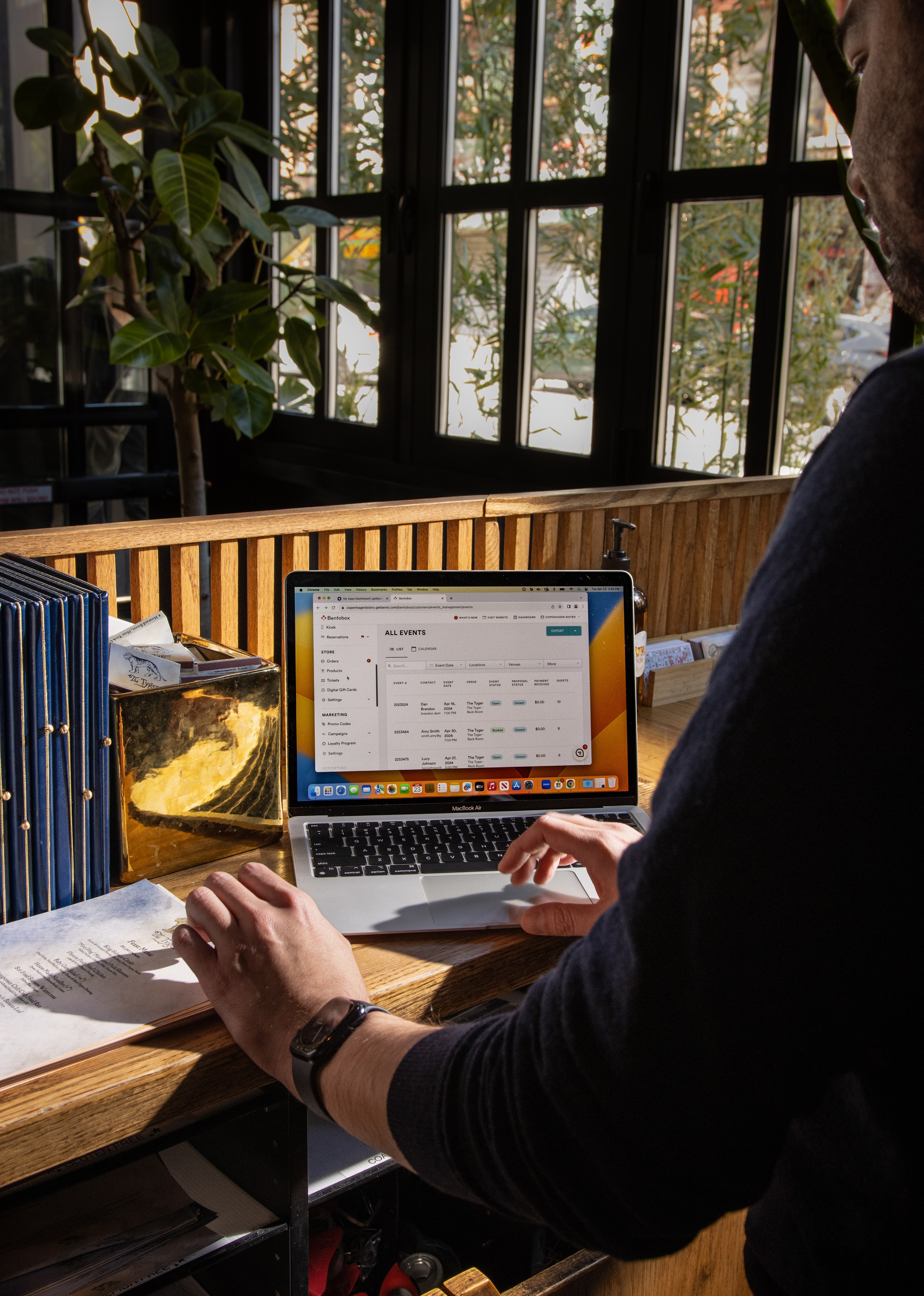Restaurant Forward
The Next Phase of Food Tech with Kristen Hawley
October 5, 2022
Restaurant technology’s favorite beat writer on the relaunch of Expedite and the biggest story of her career.
Restaurant Forward profiles the technology, trends and people changing the face of hospitality. Have a trend or industry expert you’d like to see featured? Send suggestions to RestaurantForward@getbento.com.
When it comes to covering restaurant technology, Kristen Hawley is in a class of her own. For nearly ten years, the writer behind the Expedite newsletter has been the most trusted source for news and analysis at the intersection of technology and the restaurant business. A journalist by training and a lover of restaurants by nature, Hawley takes it upon herself to interrogate and interpret the endless claims of food technology vendors for the benefit of restaurant operators.
Hawley started writing about restaurant technology in 2013, with the launch of her Chefs+Tech newsletter, which was later acquired by Skift, where Hawley served as Founding Editor of Skift Table until May 2019. On August 9 of that year, Hawley re-entered the newsletter game with the first issue of Expedite and quickly established it as a must-read weekly for restaurants and the companies (ahem) that support them. COVID hit seven months later and, overnight, changed what it meant to write a newsletter focused on helping restaurants.
This fall, Expedite is starting a new chapter. In August 2022, Hawley teased a relaunch of her newsletter that will double its publication to twice per week, feature a fresh redesign and offer new kinds of content behind a paywall.
After half a generation of work, Hawley remains as excited for — and skeptical of — the promise of restaurant technology as she’s ever been. To learn what she has planned for Expedite and what she sees next in the space, we sat down for a fascinating discussion with food tech’s primary beat writer.

BentoBox: To start off, can you tell us what is changing with the relaunch of Expedite?
Hawley: The short version is that the newsletter has a new design and a twice-weekly cadence, but there are some deeper reasons behind the changes.
Ever since I launched my first newsletter, I have wanted to publish analysis asking “What does it mean?” about restaurant technology. But a few months after I started Expedite in 2019, COVID happened. There was so much information coming so quickly: “Here’s a restaurant going to grocery. Here’s options for to-go. This software company isn’t going to send you bills anymore. Here’s a list of resources you can use.”
I spent a good year just explaining what was happening moment-to-moment. For the first time in my career, I had no idea what was going to happen, which is what I’ve always written about. I couldn’t give anyone a view of the future.
And now that that’s starting to normalize, it’s letting all of us get back to business. I was interviewing a restaurateur last week who told me, “We’re tired of waiting for ‘back to normal.’” Like, this is it. Restaurants are doing their thing.
So that’s been the evolution of Expedite: from “Here’s how you keep your head above water,” to “We don’t know what the future is, but here’s where we are now,” to “Here are some clear signals about what’s going to happen in restaurants and restaurant technology, and here’s what they mean.”
The techy restaurants are here; they’re established. But to compete against them, you don’t necessarily need to become them.
Your recent newsletters have indeed felt more like opinion and analysis than breaking news.
I never wanted to break news! (Well, sometimes I do.) I will say this: in 2013, I was the only one, or among a very, very short list of people, covering restaurant tech specifically. But now the B2B publications cover it. Media outlets hired tech editors. It’s on CNBC. At this point, I’m not out to compete with the Journal for a story about DoorDash.
So part of my relaunch is that I want to focus on what it all means. I now get two chances a week to put out something interesting. I think what’s most exciting right now is a little bit of analysis and provocative thought. Especially because these companies that I’ve covered since they were startups are behemoths now, and you can punch up at behemoths. You never want to punch down at a startup, right?
Don’t get me wrong, I have no problem saying, “this is a bad idea, and here’s why.” But overall I think there’s a lot more room for analysis at this point, and I want to make sure my voice is in there. Especially as a woman in the space, which is another big focus of new Expedite. I have a couple of new columns and one is about women in restaurant technology, which has been a point of great importance for me personally. Because there are some great women in the business and their contributions are often overlooked by mainstream publications.
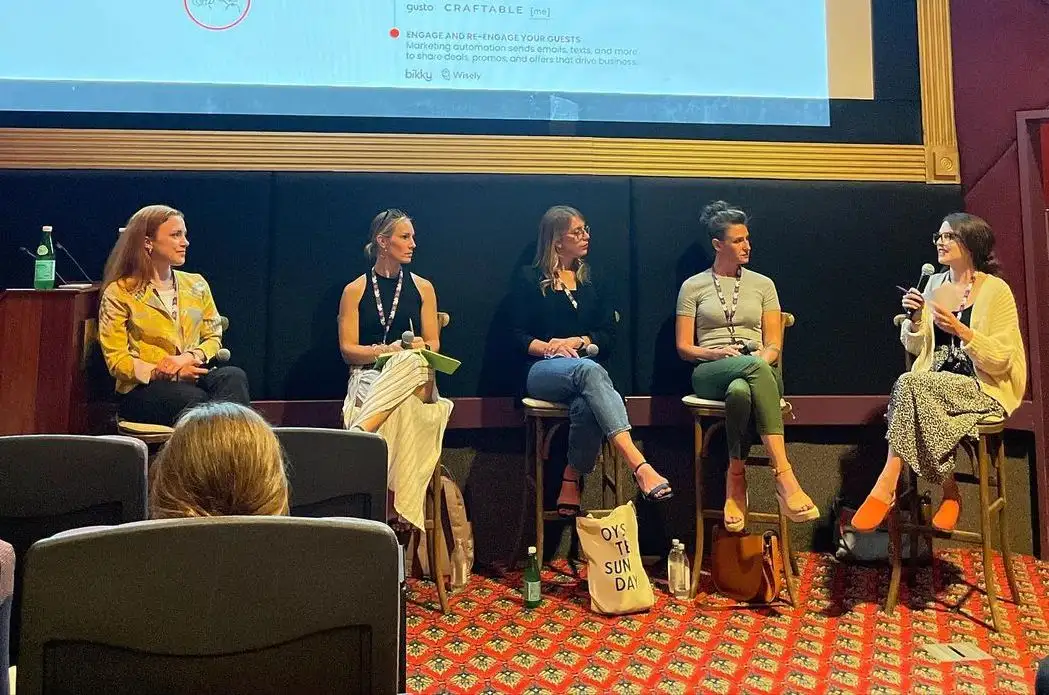
Hosting a panel at Fab, a workshop for women in hospitality, June 6, 2022
Have you gotten the sense that restaurants care about keeping up with technology?
Some do. Look what happened with COVID: when restaurants had to rely on delivery and online ordering, a lot of them felt either left behind or taken advantage of. That was an eye-opening moment. Now they’re getting sales calls every day from some company with a fleet of virtual brands they just pulled out of thin air that wants to sell out their kitchen. If you don’t know what that means, that sales pitch is really easy to fall for. So I think there is a real need to understand the basics and whether it’s really for you. And it may be! There’s no bad technology if it’s working for someone.
I’m wondering if you have a tagline or guiding motto for Expedite.
I have one right now that is, “Smart analysis on the future of restaurants and the business of hospitality” or something like that. It used to be “news and analysis”’ and I’ve sort of changed it to, simply, “the big ideas that will change the future in restaurants.”
I should probably hone this. I know an Expedite story when I see one.
Perfect, let’s talk about that. In your career, what has been the biggest non-COVID story arc you’ve covered?
I would say, the rise of the third-party marketplaces. These companies have established themselves as huge forces in the industry that will not go away and cannot be ignored. There is no “delete your app,” there is no, like, order direct movement that will knock them off their game. Yes, you can certainly do that, and I’d encourage smaller companies to keep competing and challenging the big guys, but it’s not going to diminish the importance of these channels.
I’ve often said that big delivery is for big restaurants. I still think that’s true; I think we’ll continue to move in that direction, where it’s big enterprise partnerships that are really buoying the third party companies. But we can already see that they’re not getting out of restaurants, they’re getting into more verticals. They all have capital programs, they’ll lend you money, it’s… it’s there. They’re huge. And yeah, it’s been interesting to see these scrappy startups become massive.
There’s no bad technology if it’s working for someone.
If I gave you $5 million to invest in restaurant tech today, where would you put it?
Honestly, probably something really boring. You know, inventory or P&L or something that helps the back office. Because that’s where I think you can make the biggest change right now. Even though there are lots of companies in that space, doing that work, it’s been a slog to get rid of paper and Excel spreadsheets.
That’s an interesting answer, because it seems to imply that restaurants only need to optimize around the edges of this perfected system. Whereas a few years ago, it seemed like technology was going to bring wholesale transformation to the industry. Did technology let us down?
No, I think what you’re seeing is the fragmenting of the industry.
When you have a concept that is super tech-forward, like Sweetgreen for example, they’re built on technology. That’s how they run. Well, those businesses are off and running. They’re established. Sweetgreen is a public company. That was the answer to how technology was going to revolutionize the industry — along with the third-party companies.
However, people still want dine-in experiences. That’s where you can find the incremental change; where technology can tweak things to make them better but leave the experience intact. And that’s cool. What’s interesting to me, as a fan of restaurants in the traditional sense, is that there are some small efficiencies and modernizations that can be managed very quietly, that the diner would never know about, that will help the business.
I never thought that some big change was going to affect all restaurants. I think it just opened up more opportunities for different types of businesses to go big. So yeah, the techy restaurants are here; they’re good. That was a huge change. But to compete against them, you don’t necessarily need to become them.
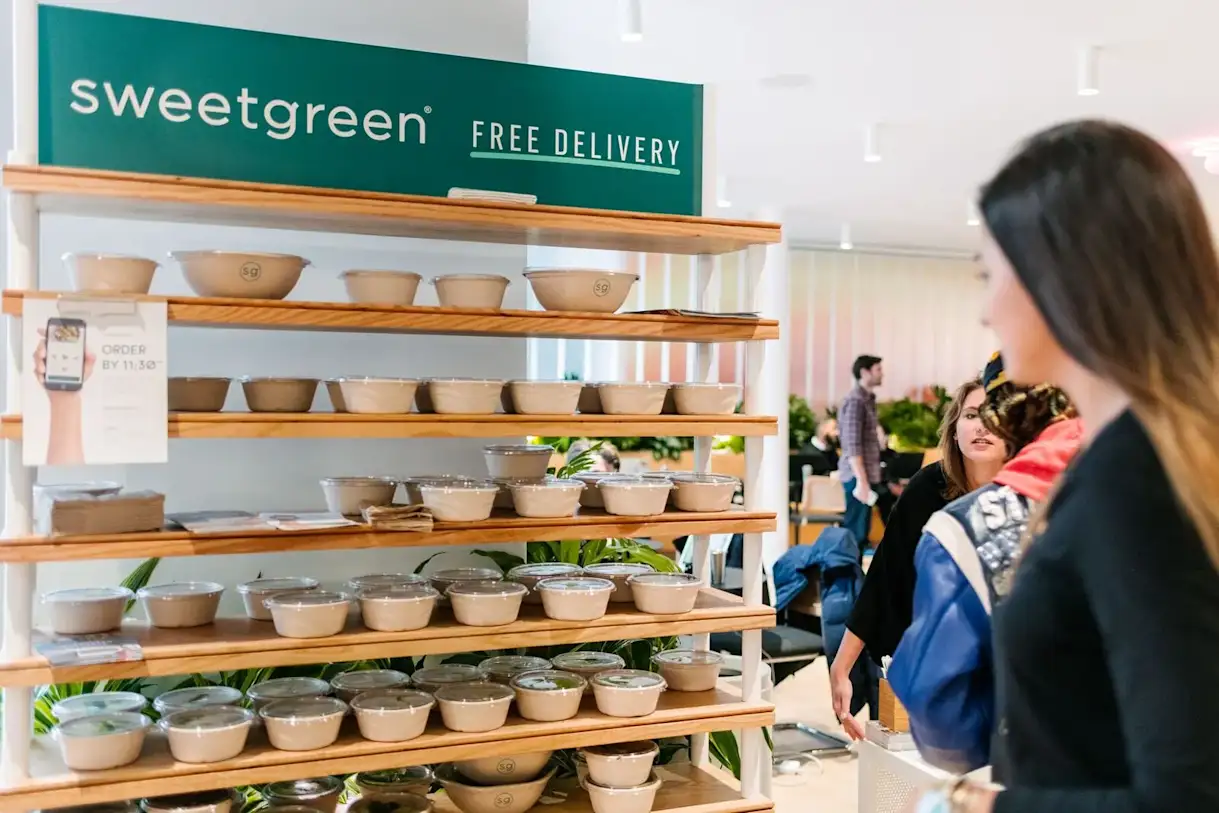
I’m curious how you see the relationship between Expedite and traditional food media. Outlets like Eater, Bon Appétit, Food & Wine.
I think we’re on completely different tracks, but I also think people who enjoy reading about food and restaurants should understand how restaurants work. And there is more of an appetite for that now than ever.
Personally, I’ve never been busier than when COVID struck. Suddenly everybody was like, “Wait a second, that business is terrible! And the margins are bad! And it’s not sustainable!” And anyone who knows anything about working in restaurants was like, “Yeah, we’re not in it to make billions of dollars, we’re in it because of the love of food, or the love of hospitality,” or just, you enjoy it, it’s a great business.
I’m obviously a fraction of the size of a traditional food publication, and so I enjoy writing for them because it gives me a larger platform for this message. Which is: if you like restaurants, and you like dining out, you should understand what and how the people who run them think.
One last question. You recently started a podcast with Andrew Genung from Family Meal. Did you two get together by saying, “We’re the only two relevant food newsletters, let’s do a podcast?”
Yes. One hundred percent. That could have been a line from his email, I think.
To learn more about Kristen Hawley, follow her on Twitter at @kh, on Instagram at @kristen, and subscribe to her newsletter at Expedite.news.

BentoBox Marketing & Commerce Platform
Deliver Smarter Hospitality
Want to stand out online, bring in more money, engage your diners, and streamline operations?
Recommended
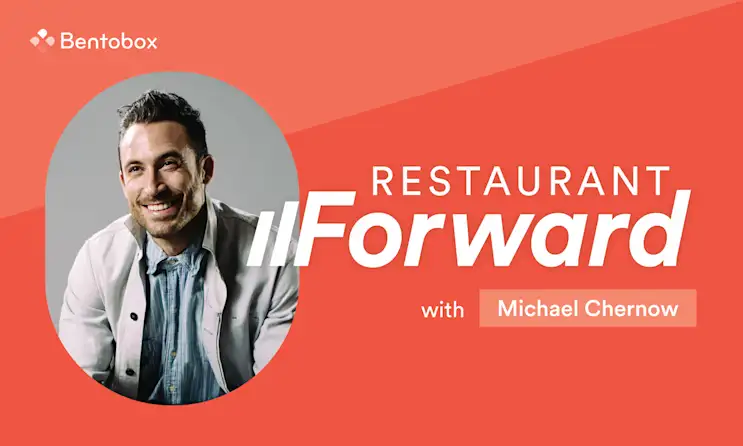
Restaurant Forward
Building Healthy Habits in the Kitchen with Michael Chernow
November 10, 2022
The restaurateur behind NYC’s Meatball Shop and Seamore’s on why more chefs are taking their health seriously, and how you can do the same.

Restaurant Forward
Intentional Hospitality in a Gentrifying World with Studio ATAO
November 21, 2022
How restaurants opening in disinvested neighborhoods can engage with their communities and be part of the solution.
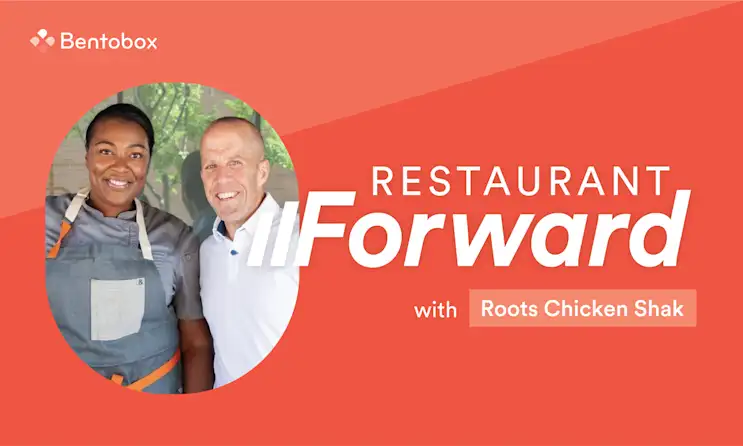
Restaurant Forward
Closing the Racial and Gender Wealth Gap with Roots Chicken Shak
September 7, 2022
How a Texas fast-casual brand is reimagining the franchise model as a revolutionary (and profitable) form of social entrepreneurship.
